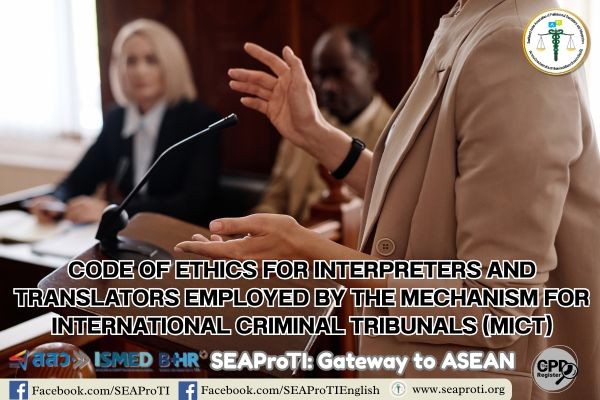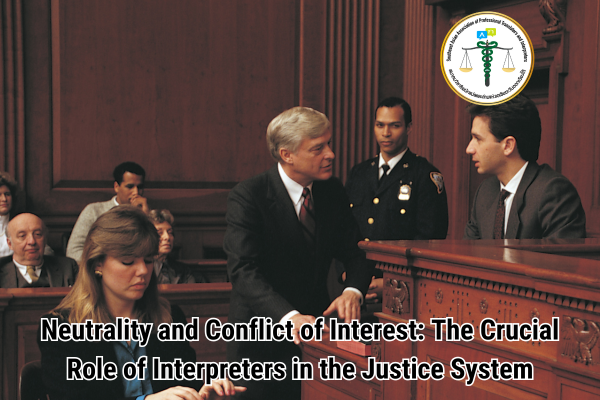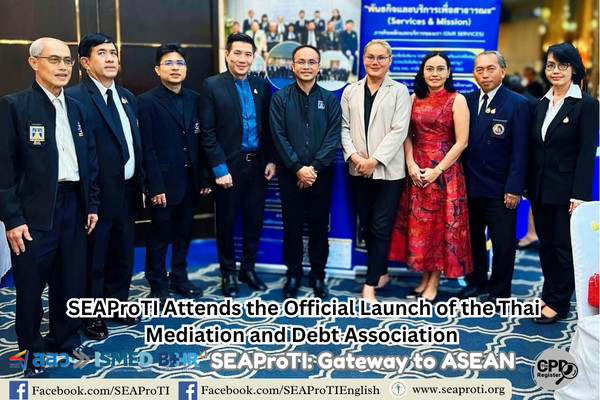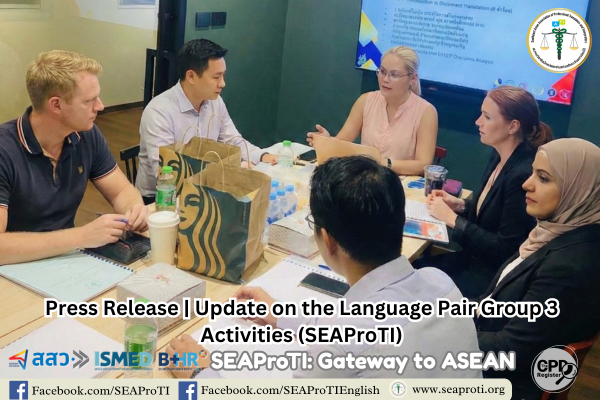CODE OF ETHICS FOR INTERPRETERS AND TRANSLATORS EMPLOYED BY THE MECHANISM FOR INTERNATIONAL CRIMINAL TRIBUNALS (MICT)
(Promulgated 2 November 2017, The Hague, The Netherlands)
Preamble
This Code of Ethics affirms the belief that interpreters and translators employed by the Mechanism must uphold the highest standards of professionalism, integrity, and accountability.
-
As employees of the Mechanism, interpreters and translators must maintain exemplary conduct consistent with the dignity of judicial service.
-
Their functions demand accuracy, independence, impartiality, and unwavering respect for confidentiality.
-
Their ethical obligations extend beyond the termination of employment, and any breach of these duties may lead to disciplinary action, including referral to relevant professional bodies.
I. Preliminary Provisions
Article 1: Definitions
For the purposes of this Code:
-
Interpreters are persons engaged by the Mechanism—under any form of contract, including short-term or special service agreements—who perform simultaneous or consecutive interpretation of Mechanism proceedings or activities, regardless of work location.
-
Translators are persons engaged under similar contractual arrangements to translate written materials provided to the Language Support Services (LSS).
-
LSS refers to the Language Support Services of the Mechanism.
Article 2: General Application
-
This Code applies to all interpreters and translators as defined above.
-
It shall be interpreted to uphold the objectives and values articulated in the Preamble.
-
The provisions herein shall not be applied restrictively.
-
References in the singular include the plural and vice versa.
-
Staff members are additionally bound by the United Nations Staff Rules and Regulations and relevant administrative instructions.
II. Professional Conduct
Article 3: Standards of Conduct
-
Interpreters and translators shall conduct themselves courteously, politely, and with dignity at all times.
-
Interpreters must maintain a professional attitude in all interactions with judges, court officers, witnesses, lawyers, and other stakeholders, preserving impartial detachment.
Article 4: Integrity and Independence
-
No personal or external interest shall interfere with the performance of professional duties.
-
Interpreters and translators shall not solicit or accept gifts, benefits, or favors.
-
They shall not exercise influence over listeners or readers.
-
Integrity and independence must be maintained under all circumstances.
Article 5: Reliability
-
Interpreters and translators shall respect all appointment times and deadlines, notifying supervisors promptly in case of delay or impediment.
-
Court interpreters must inform judges of any lexical or conceptual uncertainty affecting interpretation accuracy.
III. Duties Toward the Mechanism
Article 6: Confidentiality
-
General Obligations
-
All information obtained in the course of duty shall be treated with utmost discretion and not disclosed to any unauthorized person or entity.
-
Confidential information may be shared only with authorized colleagues whose duties require access.
-
Translated materials remain the property of the Mechanism and shall not be released without explicit authorization.
-
Discussion of pending cases is prohibited outside professional contexts within LSS.
-
No personal gain shall be derived from confidential information.
-
-
Lawyer–Client Privilege
-
Information obtained during privileged communications must not be disclosed without express consent.
-
-
Continuation of Obligations
-
The duty of confidentiality continues after employment ends.
-
Article 7: Impartiality
-
Interpreters and translators shall exercise strict impartiality in their duties.
-
They shall not offer legal advice or recommend specific counsel.
-
Any actual or perceived conflict of interest must be disclosed immediately to a supervisor.
IV. Proficiency and Competence
Article 8: Competence
-
Scope of Expertise
-
Interpreters and translators shall only accept assignments within their proven competence.
-
Should the task exceed their technical or linguistic capacity, they must withdraw.
-
They must ensure that working conditions allow for accurate performance and alert relevant parties to technical or logistical issues affecting quality.
-
-
Preparation
-
Adequate preparation is essential. Interpreters and translators must familiarize themselves with relevant materials and terminology prior to assignments.
-
Article 9: Accuracy
-
Truth and Completeness
-
Messages must be conveyed faithfully, accurately, and neutrally.
-
Interpreters must render the entire message, including vulgarities, emotional tone, and non-verbal cues.
-
No additions, omissions, or edits are permitted.
-
Even apparent errors or falsehoods must be conveyed as stated.
-
-
Correction and Clarification
-
Mistakes must be promptly acknowledged and corrected.
-
When unclear, interpreters must request repetition or clarification.
-
-
Clear Delivery
-
Interpreters shall ensure that their speech is audible and comprehensible to all participants.
-
Adopted by:
Olufemi Elias, Registrar
Date: 2 November 2017
Location: The Hague, The Netherlands
จรรยาบรรณของล่ามและนักแปลประจำกลไกศาลอาญาระหว่างประเทศ (MICT)
(ประกาศ ณ วันที่ 2 พฤศจิกายน พ.ศ. 2560 ณ กรุงเฮก ประเทศเนเธอร์แลนด์)
คำนำ
จรรยาบรรณฉบับนี้จัดทำขึ้นโดยตระหนักว่า ล่ามและนักแปลซึ่งปฏิบัติงานในกลไกศาลอาญาระหว่างประเทศ จำเป็นต้องรักษามาตรฐานแห่งความเป็นมืออาชีพระดับสูงสุด และยึดมั่นในความซื่อสัตย์ สุจริต และความรับผิดชอบต่อหน้าที่
-
ในฐานะเจ้าหน้าที่ของกลไกฯ ล่ามและนักแปลต้องประพฤติปฏิบัติตนให้เหมาะสมกับเกียรติแห่งตำแหน่งและภารกิจในกระบวนการยุติธรรมระหว่างประเทศ
-
หน้าที่ของล่ามและนักแปลกำหนดให้ต้องปฏิบัติงานด้วยความถูกต้อง เป็นอิสระ ปราศจากอคติ และรักษาความลับอย่างเคร่งครัด
-
ภาระหน้าที่ทางจริยธรรมดังกล่าว ยังคงมีผลบังคับแม้พ้นจากการจ้างงานแล้ว และการละเมิดอาจนำไปสู่การดำเนินการทางวินัยหรือการรายงานต่อองค์กรวิชาชีพทั้งในระดับชาติหรือระหว่างประเทศ
ส่วนที่ 1: บททั่วไป
ข้อ 1: คำจำกัดความ
เพื่อวัตถุประสงค์ของจรรยาบรรณฉบับนี้
-
“ล่าม” หมายถึง บุคคลที่กลไกฯ ว่าจ้าง ไม่ว่าจะด้วยสัญญาระยะยาว ระยะสั้น หรือสัญญาบริการพิเศษ ให้ปฏิบัติงานแปลภาษาแบบพร้อมกันหรือแบบตามลำดับ ในการพิจารณาหรือกิจกรรมใด ๆ ของกลไกฯ ไม่ว่าปฏิบัติงานในสถานที่ใด
-
“นักแปล” หมายถึง บุคคลที่กลไกฯ ว่าจ้างในลักษณะเดียวกัน เพื่อแปลเอกสารเป็นลายลักษณ์อักษรซึ่งส่งต่อมายังหน่วยบริการสนับสนุนด้านภาษา (Language Support Services – LSS)
-
“LSS” หมายถึง หน่วยบริการสนับสนุนด้านภาษาของกลไกฯ
ข้อ 2: การบังคับใช้ทั่วไป
-
จรรยาบรรณนี้มีผลบังคับใช้แก่ล่ามและนักแปลตามที่ให้คำจำกัดความไว้ข้างต้น
-
การตีความและการบังคับใช้ต้องเป็นไปเพื่อให้บรรลุเจตนารมณ์และค่านิยมตามที่ระบุไว้ในคำนำ
-
ข้อกำหนดทั่วไปในจรรยาบรรณนี้ต้องไม่ถูกตีความอย่างแคบ
-
คำพหูพจน์ให้หมายความรวมถึงเอกพจน์ และในทางกลับกัน
-
ผู้ซึ่งเป็นเจ้าหน้าที่ประจำของกลไกฯ ต้องอยู่ภายใต้กฎและข้อบังคับของเจ้าหน้าที่สหประชาชาติ รวมถึงคำสั่งทางปกครองที่เกี่ยวข้องด้วย
ส่วนที่ 2: ความประพฤติทางวิชาชีพ
ข้อ 3: มาตรฐานแห่งความประพฤติ
-
ล่ามและนักแปลต้องมีความสุภาพ เรียบร้อย และสง่างามอยู่เสมอ
-
ล่ามต้องรักษาท่าทีทางวิชาชีพในการติดต่อกับผู้พิพากษา เจ้าหน้าที่ศาล พยาน ทนายความ และบุคคลอื่นที่เกี่ยวข้องกับการทำงานของกลไกฯ โดยคงไว้ซึ่งความเป็นกลางตลอดเวลา
ข้อ 4: ความซื่อสัตย์และความเป็นอิสระ
-
ล่ามและนักแปลต้องไม่ยอมให้ผลประโยชน์ส่วนตัวหรืออื่นใดมารบกวนการปฏิบัติหน้าที่
-
ต้องไม่เรียกรับหรือยอมรับของขวัญ ผลประโยชน์ หรือสิ่งตอบแทนใด ๆ ในขณะปฏิบัติหน้าที่
-
ต้องไม่ใช้อำนาจหรืออิทธิพลเพื่อชักจูงผู้ฟังหรือผู้อ่าน
-
ต้องคงไว้ซึ่งความซื่อสัตย์และความเป็นอิสระตลอดเวลา
ข้อ 5: ความน่าเชื่อถือและความรับผิดชอบ
-
ล่ามและนักแปลต้องตรงต่อเวลาและส่งงานตามกำหนด หากไม่สามารถปฏิบัติได้ต้องแจ้งหัวหน้างานทันทีเพื่อดำเนินการแก้ไข
-
ล่ามซึ่งปฏิบัติงานในห้องพิจารณาคดีต้องแจ้งผู้พิพากษาเมื่อเกิดข้อสงสัยหรือช่องว่างทางคำศัพท์ระหว่างภาษาต้นทางกับภาษาปลายทาง
ส่วนที่ 3: หน้าที่ต่อกลไกศาล
ข้อ 6: การรักษาความลับ
-
หน้าที่ทั่วไป
-
ล่ามและนักแปลต้องรักษาความลับสูงสุดในทุกเรื่องที่เกี่ยวข้องกับหน้าที่ และต้องไม่เปิดเผยข้อมูลใด ๆ ที่ยังไม่เผยแพร่ต่อสาธารณะต่อบุคคลหรือองค์กรภายนอก
-
ข้อมูลที่ได้รับในความไว้วางใจหรือทราบโดยเหตุแห่งตำแหน่ง สามารถเปิดเผยได้เฉพาะแก่ผู้มีหน้าที่เกี่ยวข้องภายในกลไกฯ หรือได้รับอนุญาตจากหัวหน้างานเท่านั้น
-
เอกสารแปลทั้งหมดถือเป็นทรัพย์สินของกลไกฯ ห้ามนำไปเผยแพร่หรือแสดงต่อบุคคลภายนอก เว้นแต่ได้รับอนุญาตจากหัวหน้าหน่วย LSS หรือโดยคำสั่งของกลไกฯ
-
ห้ามสนทนาเกี่ยวกับข้อเท็จจริงของคดีที่อยู่ระหว่างพิจารณา เว้นแต่ในประเด็นเชิงวิชาชีพภายใน LSS
-
ห้ามใช้ข้อมูลลับเพื่อประโยชน์ส่วนตนไม่ว่ากรณีใด
-
-
สิทธิพิเศษระหว่างทนายและลูกความ
-
ข้อมูลที่ได้จากการสนทนาในลักษณะสิทธิพิเศษตามกฎหมายต้องได้รับการปกปิด และจะเปิดเผยได้ต่อเมื่อได้รับความยินยอมจากบุคคลที่เกี่ยวข้องและทนายของเขาเท่านั้น
-
-
การคงอยู่ของหน้าที่
-
หน้าที่ในการรักษาความลับยังคงมีผลบังคับแม้พ้นจากการจ้างงานแล้ว
-
ข้อ 7: ความเป็นกลาง
-
ล่ามและนักแปลต้องรักษาความเป็นกลางอย่างเคร่งครัด
-
ต้องไม่ให้คำปรึกษาทางกฎหมายแก่บุคคลใด ไม่ว่าจะร้องขอหรือไม่ก็ตาม และต้องไม่แนะนำทนายเฉพาะรายให้แก่ผู้ต้องสงสัยหรือจำเลย
-
ต้องเปิดเผยต่อหัวหน้างานทันทีเมื่อมีหรืออาจมีผลประโยชน์ทับซ้อนในระหว่างการปฏิบัติหน้าที่
ส่วนที่ 4: ความสามารถทางวิชาชีพ
ข้อ 8: ความชำนาญและการเตรียมความพร้อม
-
ขอบเขตของความสามารถ
-
ล่ามและนักแปลต้องรับงานเฉพาะที่อยู่ในขอบเขตความรู้และความสามารถของตน
-
หากพบว่าภารกิจเกินขีดความชำนาญ ต้องแจ้งขอถอนตัวโดยสมัครใจ
-
ต้องตรวจสอบให้แน่ใจว่าสภาพการทำงานเอื้อต่อการสื่อสารที่ถูกต้อง และแจ้งทันทีเมื่อมีอุปสรรคทางเทคนิคหรือปัจจัยอื่นที่กระทบต่อความแม่นยำของการแปล
-
-
การเตรียมการล่วงหน้า
-
ต้องศึกษาข้อมูลล่วงหน้าเกี่ยวกับหัวข้อ เนื้อหา หรือบริบทของงาน และเตรียมคำศัพท์เฉพาะที่จำเป็นอย่างรอบคอบก่อนเริ่มปฏิบัติหน้าที่
-
ข้อ 9: ความถูกต้องแม่นยำ
-
ความจริงและความครบถ้วน
-
ล่ามและนักแปลต้องถ่ายทอดข้อความอย่างซื่อสัตย์ ถูกต้อง และเป็นกลางที่สุดเท่าที่เป็นไปได้
-
ล่ามต้องถ่ายทอดข้อความทั้งหมด รวมถึงคำพูดหยาบคาย คำดูหมิ่น น้ำเสียง และอารมณ์ของผู้พูด เพื่อให้ผู้ฟังเข้าใจบริบทอย่างครบถ้วน
-
ห้ามเพิ่มเติม ตัดทอน หรือแก้ไขข้อความใด ๆ จากเนื้อหาต้นฉบับ
-
หากผู้พูดหรือเอกสารต้นฉบับมีข้อความผิดพลาดหรือไม่เป็นความจริง ต้องถ่ายทอดตามจริงโดยไม่แก้ไข
-
-
การแก้ไขและชี้แจง
-
หากพบข้อผิดพลาดในการแปล ต้องรีบแก้ไขโดยทันที
-
หากมีความไม่ชัดเจน ต้องขอให้ผู้พูดทวนหรืออธิบายเพิ่มเติม
-
-
การสื่อสารที่ชัดเจน
-
ล่ามต้องมั่นใจว่าผู้ฟังสามารถได้ยินและเข้าใจคำแปลของตนอย่างชัดเจนที่สุด
-
ประกาศโดย
โอลูเฟมี อีเลียส (Olufemi Elias)
นายทะเบียน (Registrar)
วันที่: 2 พฤศจิกายน พ.ศ. 2560
สถานที่: กรุงเฮก ประเทศเนเธอร์แลนด์

























